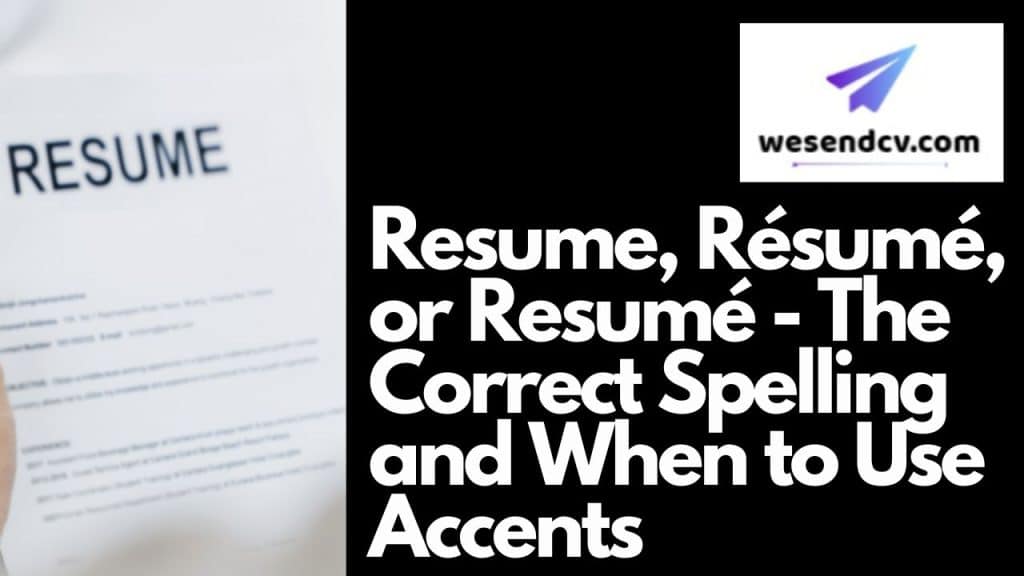There has always been some confusion around the correct spelling of the word “resume.” Is it “Resume,” “Résumé,” or “Resumé”? This question might seem trivial, but it’s one that many job seekers face when preparing their job application documents.
In this article, we’ll break down the differences between these variations, where they come from, and when to use each one.
Main Highlights of Content
Toggle1. The Origins of “Résumé”
The word “résumé” comes from the French language, where it means “summary.” The accents over the ‘e’s are known as acute accents, and in French, these accents help to clarify pronunciation. In its original French context, “résumé” refers to a brief summary of one’s qualifications or experiences—exactly how we use it in English.
In modern-day English, the use of the French spelling has been modified over time, and the word is now written in different forms, each with its own level of correctness or preference depending on the audience and context.
Let’s explore the variations:
2. Résumé: The Traditional and Most Formal Spelling
What it means:
The spelling “résumé” is the most technically accurate form of the word. It stays true to its French origins, with both acute accents included.
When to use it:
- Formal settings: If you’re applying for jobs in industries that value formality or professionalism (e.g., law, academia, or certain corporate jobs), using “résumé” with both accents is often seen as the most polished choice.
- International applications: If you’re applying for a position in a French-speaking country or for a global company with strong ties to French-speaking regions, this spelling shows respect for the word’s roots and gives an air of international awareness.
Example in context:
“Please submit your résumé and cover letter by the end of the week.”
In this example, using the accented form can indicate attention to detail and formality, especially in professional or international contexts.
Pronunciation:
With the accents, the word is pronounced ray-zoo-may (Re-zoo-may in French), giving it a soft and formal touch.
3. Resume: The Simplified, Modern American English Version
What it means:
The “resume” spelling (without accents) has become widely accepted in American English. It is a simplified version of the original French “résumé” and removes the accents, aligning more with English spelling conventions.
When to use it:
- Everyday use: If you’re applying for jobs in the United States or countries where English is the primary language, the unaccented “resume” is perfectly acceptable and widely understood.
- Casual or less formal applications: When applying for entry-level positions, non-academic roles, or within industries where language formality is less important (like tech startups or creative industries), dropping the accents is fine.
- Online applications: Many digital job platforms, like LinkedIn, might not handle accented characters well, and using “resume” ensures there are no technical hiccups when submitting documents.
Example in context:
“Make sure your resume includes relevant work experience and skills that align with the job description.”
This form is simple, easy to understand, and works well in almost all modern-day applications, especially in the United States.
Pronunciation:
Even without the accents, it is pronounced ray-zoo-may. However, many native English speakers tend to pronounce it as reh-zoo-may, making it slightly more casual.
4. Resumé: The Middle Ground
What it means:
“Resumé” is the third option and is seen as a middle ground between the formal “résumé” and the simplified “resume.” In this version, only one accent (acute accent) remains on the second ‘e.’
When to use it:
- Semi-formal settings: If you want to strike a balance between professionalism and simplicity, “resumé” can be an appropriate choice. It acknowledges the word’s French origins while not being as strict as the fully accented “résumé.”
- Common misunderstanding: Some people opt for “resumé” mistakenly thinking it’s the correct spelling. Others use it because they’re unsure of the rules but want to include at least one accent for some level of formality.
Example in context:
“I’ll send you my resumé by tomorrow morning for review.”
While technically not incorrect, this version is less commonly accepted in professional circles, particularly in writing. It may not have the same consistent usage as the other two spellings.
Pronunciation:
Even with just one accent, it’s still pronounced the same way as “ray-zoo-may”.
5. So, Which Version Should You Use?
While all three versions are commonly seen, the choice of which one to use often depends on where you live, the type of job you’re applying for, and the level of formality required in your industry.
Here’s a simple guide:
- Résumé: Most professional and polished; use it in formal settings or if applying to international or academic jobs.
- Resume: Simplest, widely accepted in the U.S. and everyday professional use.
- Resumé: Acceptable middle ground, but can look out of place in highly formal or academic situations.
6. Examples of Use in Different Contexts
Tech Industry:
When applying for a tech role like a software developer or UX designer, most recruiters and hiring platforms in the U.S. use “resume” without accents. In fast-paced, modern environments, simplicity and ease of understanding are valued. A resume without accents looks clean and uncluttered.
Academic or Research Position:
For academic or research roles, such as a university lecturer or scientist, using the formal spelling “résumé” is recommended. These industries often emphasize formality and accuracy, and including accents shows that you respect the formal standards.
International Job Applications:
If you’re applying for a role in a French-speaking country or any European country, sticking to “résumé” with accents is important. European recruiters are more likely to expect the traditional spelling.
7. Does Using Accents Affect ATS Systems?
Many job applicants worry about whether using accents will interfere with Applicant Tracking Systems (ATS). Some older ATS software might not recognize accented characters, potentially leading to issues with resume parsing.
Best practice: When submitting resumes through an ATS, it’s generally safer to avoid the accents and use the simpler “resume.” This ensures that your document will be properly scanned and processed by the system without technical problems.
8. Frequently Asked Questions
Q1: Why is the accented form “résumé” not always used in English?
The accented form “résumé” comes from French, where accents help clarify pronunciation. In English-speaking countries, especially the U.S., accents are often dropped for simplicity in everyday writing. This has led to the acceptance of “resume” without accents.
Q2: Will I be judged for using “resume” instead of “résumé”?
No, in most cases, using “resume” without the accents is perfectly acceptable, especially in the U.S. or in digital job applications. It’s rare for a hiring manager to make judgments based solely on this spelling difference.
Q3: Does it really matter which version I use?
In general, no. As long as your resume is clear, concise, and well-organized, the spelling (with or without accents) will rarely affect your chances. However, if you’re applying for highly formal or international positions, using “résumé” might give you a slight edge in showing attention to detail.
Q4: Should I change my spelling based on where I’m applying?
Yes, it can help. In the U.S., “resume” is more common, while international or academic roles may prefer “résumé.” Always tailor your resume to the expectations of your audience.
9. Conclusion
Whether you use “resume,” “résumé,” or “resumé,” the most important thing is the content and presentation of your document. While the spelling can vary depending on region and industry, your resume’s clarity, structure, and relevance to the job matter most. If you’re applying in international or formal contexts, “résumé” with accents is a safe bet. For most everyday applications, however, “resume” without accents is widely accepted and understood.
Make sure your resume reflects not just the correct spelling, but the professionalism and skill you want to showcase.
Ready to polish your resume? Try our resume formatting tool here and ensure your document is job-ready!







